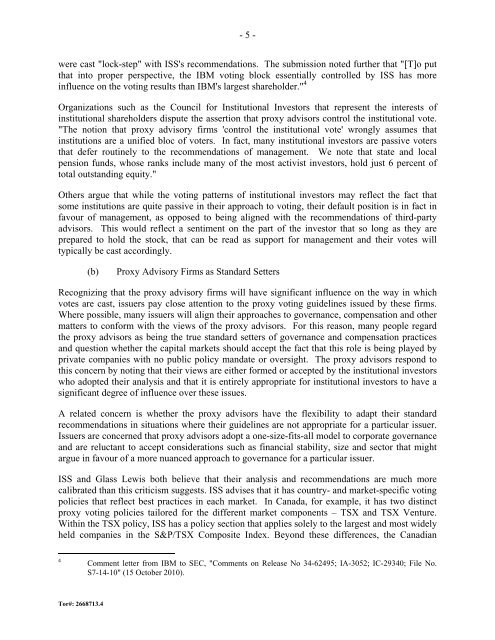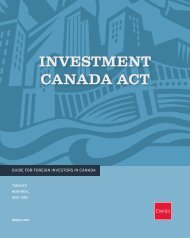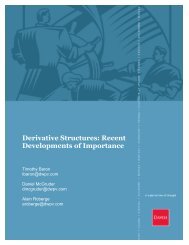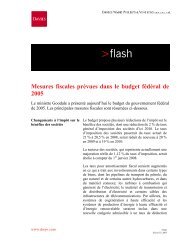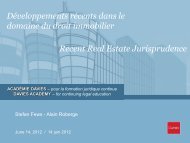The Role Of The Proxy Advisory Firm What Directors Need ... - Davies
The Role Of The Proxy Advisory Firm What Directors Need ... - Davies
The Role Of The Proxy Advisory Firm What Directors Need ... - Davies
Create successful ePaper yourself
Turn your PDF publications into a flip-book with our unique Google optimized e-Paper software.
- 5 -<br />
were cast "lock-step" with ISS's recommendations. <strong>The</strong> submission noted further that "[T]o put<br />
that into proper perspective, the IBM voting block essentially controlled by ISS has more<br />
influence on the voting results than IBM's largest shareholder." 4<br />
Organizations such as the Council for Institutional Investors that represent the interests of<br />
institutional shareholders dispute the assertion that proxy advisors control the institutional vote.<br />
"<strong>The</strong> notion that proxy advisory firms 'control the institutional vote' wrongly assumes that<br />
institutions are a unified bloc of voters. In fact, many institutional investors are passive voters<br />
that defer routinely to the recommendations of management. We note that state and local<br />
pension funds, whose ranks include many of the most activist investors, hold just 6 percent of<br />
total outstanding equity."<br />
Others argue that while the voting patterns of institutional investors may reflect the fact that<br />
some institutions are quite passive in their approach to voting, their default position is in fact in<br />
favour of management, as opposed to being aligned with the recommendations of third-party<br />
advisors. This would reflect a sentiment on the part of the investor that so long as they are<br />
prepared to hold the stock, that can be read as support for management and their votes will<br />
typically be cast accordingly.<br />
(b)<br />
<strong>Proxy</strong> <strong>Advisory</strong> <strong>Firm</strong>s as Standard Setters<br />
Recognizing that the proxy advisory firms will have significant influence on the way in which<br />
votes are cast, issuers pay close attention to the proxy voting guidelines issued by these firms.<br />
Where possible, many issuers will align their approaches to governance, compensation and other<br />
matters to conform with the views of the proxy advisors. For this reason, many people regard<br />
the proxy advisors as being the true standard setters of governance and compensation practices<br />
and question whether the capital markets should accept the fact that this role is being played by<br />
private companies with no public policy mandate or oversight. <strong>The</strong> proxy advisors respond to<br />
this concern by noting that their views are either formed or accepted by the institutional investors<br />
who adopted their analysis and that it is entirely appropriate for institutional investors to have a<br />
significant degree of influence over these issues.<br />
A related concern is whether the proxy advisors have the flexibility to adapt their standard<br />
recommendations in situations where their guidelines are not appropriate for a particular issuer.<br />
Issuers are concerned that proxy advisors adopt a one-size-fits-all model to corporate governance<br />
and are reluctant to accept considerations such as financial stability, size and sector that might<br />
argue in favour of a more nuanced approach to governance for a particular issuer.<br />
ISS and Glass Lewis both believe that their analysis and recommendations are much more<br />
calibrated than this criticism suggests. ISS advises that it has country- and market-specific voting<br />
policies that reflect best practices in each market. In Canada, for example, it has two distinct<br />
proxy voting policies tailored for the different market components – TSX and TSX Venture.<br />
Within the TSX policy, ISS has a policy section that applies solely to the largest and most widely<br />
held companies in the S&P/TSX Composite Index. Beyond these differences, the Canadian<br />
4<br />
Comment letter from IBM to SEC, "Comments on Release No 34-62495; IA-3052; IC-29340; File No.<br />
S7-14-10" (15 October 2010).<br />
Tor#: 2668713.4


